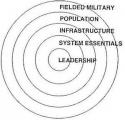A leader with a message designed to rally the masses, taking positions that the government is either unable or unwilling to adopt as their own.
But such motivation must fall upon a distinct (targetable, actionable) segment of the populace that has perceptions of poor governance for this to really take off. This "poor governance" is what I define as some combo of perceptions of:
- Illigitimacy of the current government,
- Disrespect from the current government,
- Injustice from the current government,
coupled with a perception that there is no legiitimate recourse to address these grievances.
Marx said you'd find these people in the city. Mao looked in the cities and couldn't find them. So he went to the countryside and found them there. The "rules" didn't apply, but the principles did. And no, I really don't think that communism was an existential threat then any more than I think Islamism is an existential threat now. These were just the approaches that spoke/speak to the target populaces that also take positions that the counterinsurgent is either unable or unwilling to co-opt.
To overly focus on Motivation is to totally miss the ball on Causation. This is my big beef with all of our current "experts" in Terrorism, Islam, COIN, etc. They are all shooting the hell out of the wrong target.
Those all need to be scoped, supporting efforts to a main effort that is focused on a complete overhaul of US foreign policy.
Similarly, I think most European states must be much more focused on Domestic Policy (taking a page from the US Civil Rights movement and response in the 60s) to mitigate what poses the greatest risks to their countries, and that by overly engaging down range to support current US foreign policy enforcement is actually probably counter-productive to dealing with what threatens them most.
But, it is very comforting for politicians to be able to blame their shortcomings on others...











 link to short paperon the subject.
link to short paperon the subject.
Bookmarks